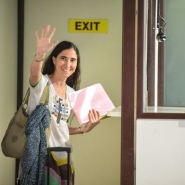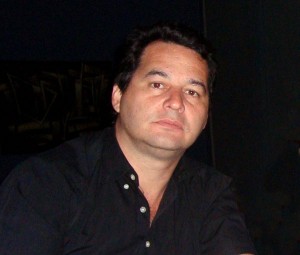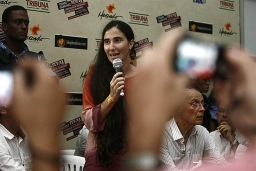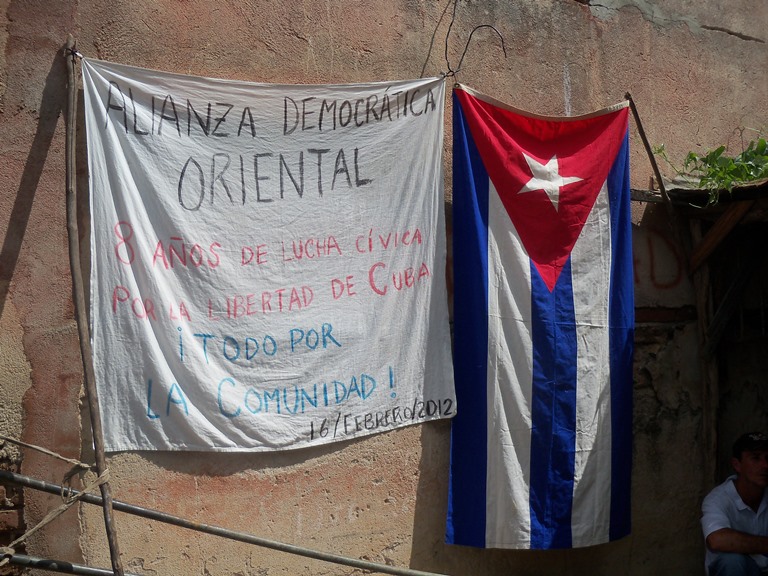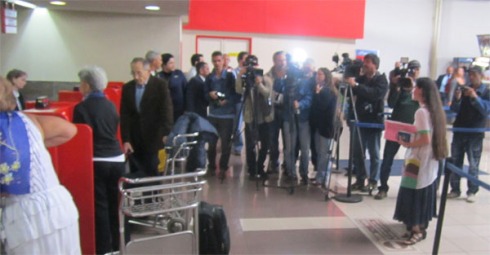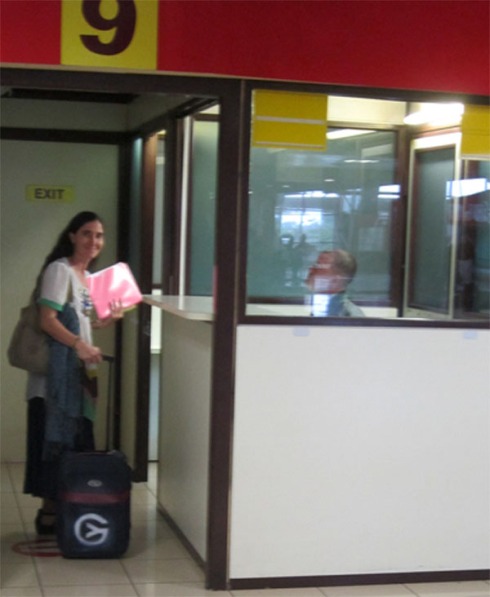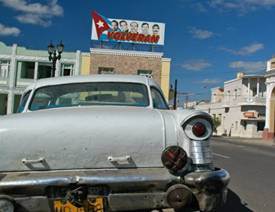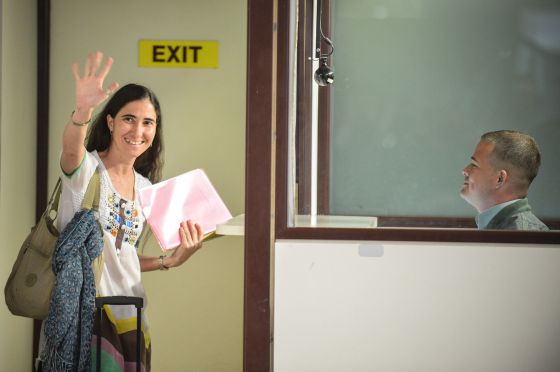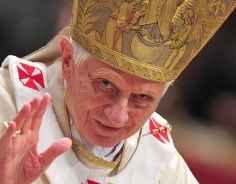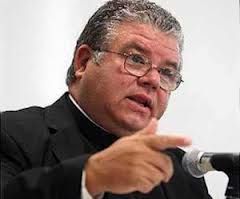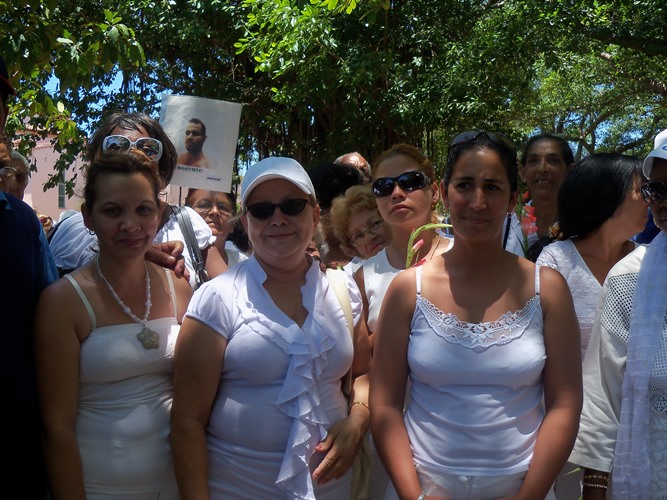José Martí was right when he said, “Government arises out of the country. The spirit of government must be that of the country. The form of government must be in accordance with the constitution. Government is nothing more than the balance between the natural elements of the country.” 1
He later added, “”Only in those countries where the form of government arises out of the nation itself will it take root.” 2
In their enthusiasm for exercising total control over Cuba, the leaders of the Cuban revolution, which triumphed on January 1, 1959, became Marxists and rapidly transitioned from recognizing the need for democratic pluralism — with its political organizations and parties that had participated in the struggle and helped secure victory — towards the imposition of a one-person and one-party dictatorship. continue reading
They let nothing stand in the way of their achieving their ends, beginning by confiscating all communications and information media and imposing strict censorship. They also nationalized schools at every level of education, “both lay and religious,” took over the entire economic infrastructure of the country and aggressively confronted anyone who opposed them.
As part of their absolutist strategy they entered into a geopolitical game with the former Soviet Union in order to guarantee a permanent hold on military as well as economic power. They copied their political and ideological patrons, and compromised the very nature of Cuban solidarity under the guise of so-called proletarian internationalism.
Cuba’s first socialist constitution, adopted in 1976, serves as irrefutable proof of their intention to Sovietize even contemporary Cuban history for the benefit of a foreign power. In its preamble the charter recognizes the support of the now-defunct Union of Soviet Socialist Republics — the USSR — in contributing to the success of socialism in Cuba. Later, after the collapse of the Soviet bloc, this preamble was revised by the National Assembly of People’s Power in July of 1992. Acknowledgment then went instead to proletarian internationalism and the fraternal friendship, aid, cooperation and solidarity of the people’s of the world, especially those of Latin America and the Caribbean.
However, the constitution’s legal justification for absolute control by the Communist Party has been retained. In Chapter 1, Article 5; Political, Social and Economic Fundamentals, the Communist Party is proclaimed as the supreme driving force of society and the state. This legitimization of one-party rule precludes any efforts to recognize political plurality and legally marginalizes those might promote it.
Cuba’s authoritarian leaders defend the claim that the Communist Party does not nominate candidates or intervene in the People’s Power elections for any municipal, provincial or national offices.
Nevertheless, electoral law provides for a commission on candidacies, which not only not only participates in the nominating process for 50% of the candidates elected to these offices, but also determines by decree who the other 50% will be. Long-time leaders, distinguished personalities, politicians, government ministers, military figures, close relatives and immediate family members of the new socio-economic class make up the list of candidates.
As a result the National Assembly of People’s Power, the supreme embodiment of state power, is made up of group of appointed figures of whom more than 95% are members of either the Communist Party or the Union of Young Communists. This can be confirmed by the current list of candidates for the 612 delegate positions up for election in February of this this year, which will convene on the 24th of this month in the National Assembly. All will be elected; there will be no surprises.
Martí touched this theme when he wrote, “One cannot be an honorable representative to Parliament if he goes laden with gratuities and favors received, and with tacit or explicit expectations by the chieftain who appoints him. Such servants cannot be in charge of defending liberty.” 3
During the entire process of crafting a dictatorship, which has now lasted fifty-four years, citizens have also been affected by their condition as active political subjects.
Forced ideologization combined with political repression has made the development and realization of a responsible citizenry an impossibility.Yet this is the basis for a democratic foundation, which expresses its interests, preferences and demands through the plurality of political parties. There is no better way. The question is whether peaceful opposition, which arose in the 1980s as an outgrowth of the human rights movement, can coalesce into a multi-party political option in the near future.
In order for realization of the democratic national interest to be viable, it is necessary for the authorities to now set the stage with appropriate respect, recognition and confidence. The legal foundation for this new climate must be adoption of the United Nations’ Convention on Civil and Political Rights, and on the Convention for Economic, Social and Cultural Rights, which have already been signed and now await ratification by the authorities, who must then put them into practice.
Under new conditions and with new freedoms citizens would begin a process of identifying and educating themselves on their rights and responsibilities as full and active members of society. They would begin to visualize ideological and political alternatives in prohibited areas of community life, and Cuban men and women would see the world in light of the freedoms of information, assembly and association, as well as others unknown until now.
Then and only then would citizens be able to recognize their pressing needs and become aware of the political options for confronting them. This could certainly be the possible or probable beginning of a journey of liberation for the nation, one which the authoritarian authorities do not even appear to be interested. For now they continue to hold on to absolute power. Rather than a transition to democracy, they are betting on a dynastic succession.
Implementation of the United Nations’ Convention on Civil and Political Rights, and the Convention on Economic, Social and Cultural Rights would create the conditions for convening a Constituent Assembly to draft a new and this time democratic constitution. A new electoral law and political parties could lead to free and open democratic elections, and the nation could soon see a national democratic state based on the rule of law. A road map could be established to specify the timing; the citizenry would determine the form of government through plebiscites. The rest would come later. But politics is, among other things, the art of the possible, and any plan or process of transition would necessarily be subject to an endless number of variables.
Since April, 2011 Cuba’s authoritarian authorities have been implementing a series of reforms, which they call Economic and Social Policy Guidelines of the Party and Revolution. Most of the economic features outlined in these guidelines make reference to or borrow aspects from various programs proposed by national political opposition to the authorities at different points in time.
Notable among them is the Common Platform for the nation from the Table of Reflection of the Moderate Opposition. It is a program for democratic transition to be carried out by various opposition groups with a range of ideological viewpoints and submitted for consideration to the Cuban government at the end of the 20th century.
The issue of governmental controls, prohibitions and restrictions is also touched upon, though with a certain reticence due to the overlap it has with the issue of politics. The new emigration law, which took effect in January of this year and which somewhat liberalizes this activity by restoring certain citizens’ right, is one example. There is still much left to be done, however, in moving towards recognition and respect for the rights of citizens, civil society and the political opposition.
It is in this area where we need to strengthen our appeals. After implementation by the authorities of the aforementioned United Nations’ conventions, there are two fundamental priorities left to be addressed:
1) Recognition by Cuban regime of the alternative political society.
2) Unfettered access to the internet for all citizens.
Achieving the first goal depends on the ability to negotiate construction of the new, democratic nation we all desire. In regards to the second, computerizing Cuban society and providing unrestricted access to the network of all networks are vital to ending underdevelopment and cognitively linking us to the rest of the international community.
“A people’s independence consists of the respect that those in power show to each of its sons,” wrote,”4 wrote Martí.
Among the variables that at this point in time will have the most impact on the process of democratization in Cuba, “which will be able to slow it but not stop it,” are:
First, the political future of the so-called Bolivarian Revolution in Venezuela.
Second, a decision to end or not end the American embargo on Cuba.
Third, the new policy of the European Union towards the Cuban government upon its fulfilling the demands of the EU’s Common Position.*
Each one of these issues comes with its own agenda and unique challenges. The complexity and importance of the three must factor into any serious tentative forecast of Cuba’s social and political future.
There is also the issue of the Cuban community overseas. The Cuban regime must decide to move towards recognition of the civil and political rights of those who have permanent residency outside of Cuba and who want to reclaim their status as citizens in order to participate in deciding the fate of our common homeland. Without addressing the legitimate interests of the Cuban diaspora in the nation’s affairs, any change or transition to democracy will be incomplete.
This is why, in light of everything outlined here, it is difficult to predict the future participation of political parties in a post-Castro Cuba. What is certain, however, is the future will see continued pluralist party activity from political organizations allied with present-day civil society.
January 28 will mark the 160 year anniversary of the most universal of all Cubans — José Julián Martí Pérez. We have highlighted here some quotes from this colossus of national thought as a testament to the relevance of his legacy. We conclude with this last quote because what it reveals:
“To be just for all, the Republic must be built by all.” 5
“The revolutionary organization must not ignore the practical needs derived from the constitution and history of the country. Nor must it work directly for the current or future predominance of any one class. Rather it must work for the whole in accordance with democratic methods and with all the active forces of the fatherland, for brotherhood and common action by Cubans living overseas, for respect and assistance from the world’s republics, and for the creation of a republic that is just and open in the confines of its borders, in its laws, in its work and in its cordiality, raised up by all and for the good of all.” 6
Rafael León Rodríguez
Havana, January 2013
2. “Las fiestas de la Constitucion en Filadefia,” El Partido Liberal, 1887. OC. t. 17, p. 47
3. La Nación, March 31, 1883, OC. t. 29, p. 50
4. Letter to J.A. Lucerna, N.Y., October 9, 1885
5. Patria, N.Y. August 6,1892, “Las expediciones y la revolución”
6. Prior resolutions, “Bases del Partido Revolucionario Cubano,” Tampa, November 28, 1891
By Rafael León Rodríguez, General Coordinator for the Cuban Democracy Project and author of the blog El Candil de Rafa.
*Translator’s note: According to the Common Position “the objective of the European Union in its relations with Cuba is to encourage a process of transition to a pluralist democracy and respect for human rights and fundamental freedoms, as well as sustainable recovery and improvement in the living standards of the Cuban people.”
